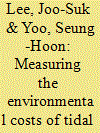| Srl | Item |
| 1 |
ID:
092731


|
|
|
|
|
| Publication |
2009.
|
| Summary/Abstract |
Korea is considering the construction of a tidal power plant (TPP) at Garolim Bay. However, as the construction of the Garolim TPP (GTPP) is expected to entail some environmental damage, it has become an increasingly important topic for public debate. Using a choice experiment (CE) approach, this study attempts to measure the economic cost that results from the environmental damage caused by the construction of GTPP. The CE is used to measure the environmental costs of individual attributes, including the reduction in the area of the tidal flat, the degradation of seawater quality, and the destruction of marine life. The results indicate that the annual willingness to pay (WTP) per household for mitigating the environmental damage that results from the worst-possible situation in relation to the present situation is about 96,042 Korean won (USD 101.1) in the seven biggest cities (off-site regions) and 18,584 Korean won (USD 19.6) in Seosan and Taean (on-site regions). This study is expected to provide policy-makers with quantitative information that will be useful to decide whether or not GTPP should be constructed.
|
|
|
|
|
|
|
|
|
|
|
|
|
|
|
|
| 2 |
ID:
141262


|
|
|
|
|
| Summary/Abstract |
The defining challenge of sustainable agriculture is the production of food and other agricultural products at an environmental cost that does not jeopardize the food security and general welfare of future generations. Feeding another three billion people in the face of climate change, biodiversity loss, and an environment already saturated with excess nitrogen and other reactive pollutants requires new approaches and new tools in the design and deployment of workable solutions. Solutions will be local but all will require an ecological systems approach that considers sustainable farming practices in the full context of ecosystems and landscapes. And their deployment will require an understanding of the social systems capable of building incentives that produce socially desired outcomes. Socioecological models for agriculture provide an opportunity to explore feedbacks, trade-offs, and synergies that can optimize and strengthen emerging connections between farming and society. With the right incentives, innovative research, and political will, a sustainable agriculture is within our reach.
|
|
|
|
|
|
|
|
|
|
|
|
|
|
|
|